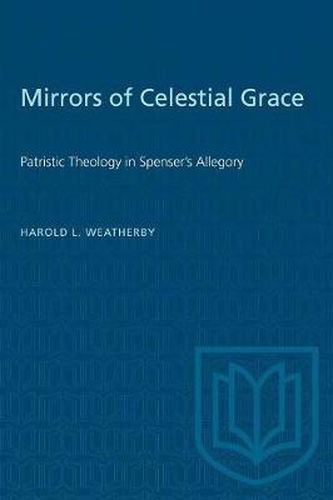Readings Newsletter
Become a Readings Member to make your shopping experience even easier.
Sign in or sign up for free!
You’re not far away from qualifying for FREE standard shipping within Australia
You’ve qualified for FREE standard shipping within Australia
The cart is loading…






Much has been written about Spenser’s theological allegory and its sources but, until now, no one has suggested sustained patristic influence. Harold Weatherby argues that taking patristic theology as a measure for certain episodes in The Faerie Queene affords more convincing evidence than the familiar (usually Protestant) references. He shows that sixteenth-century editions of the works of the principal Fathers were available to Spenser, and that, in addition, there appeard to be considerable interest in the Fathers at Spenser’s college, Pembroke. With the additional evidence of the poem itself, Weatherby introduces the theory that patristic theology affected the poet’s understanding of Christianity.
To demonstrate, the author examines seven allegorical episodes in The Faerie Queene, each of which has had extensive pervious interpretive attention, quite different from the approach taken here. He looks closely at the dragon fight and the figure of St George; the subsequent nuptial celebration with Una and Red Crosse; the role of Belphoebe as an emblem of temperance (as the Fathers conceive temperance); Guyon’s descent into Mammon’s cave; Guyon’s encounter with Mordant, Amavia, and Ruddymane, and his futile effort to cleanse the child’s hands; Arthur’s defeat of Maleger; and the presentation of Dame Nature. In each of these episodes, patristic thought is seen to have significantly shaped the allegory.
The epilogue suggest how patristic thought influenced Spenser’s presentation of eros in Books III and IV, introducting a new hypothesis about these books and about Spenser’s conception of chastity.
$9.00 standard shipping within Australia
FREE standard shipping within Australia for orders over $100.00
Express & International shipping calculated at checkout
Much has been written about Spenser’s theological allegory and its sources but, until now, no one has suggested sustained patristic influence. Harold Weatherby argues that taking patristic theology as a measure for certain episodes in The Faerie Queene affords more convincing evidence than the familiar (usually Protestant) references. He shows that sixteenth-century editions of the works of the principal Fathers were available to Spenser, and that, in addition, there appeard to be considerable interest in the Fathers at Spenser’s college, Pembroke. With the additional evidence of the poem itself, Weatherby introduces the theory that patristic theology affected the poet’s understanding of Christianity.
To demonstrate, the author examines seven allegorical episodes in The Faerie Queene, each of which has had extensive pervious interpretive attention, quite different from the approach taken here. He looks closely at the dragon fight and the figure of St George; the subsequent nuptial celebration with Una and Red Crosse; the role of Belphoebe as an emblem of temperance (as the Fathers conceive temperance); Guyon’s descent into Mammon’s cave; Guyon’s encounter with Mordant, Amavia, and Ruddymane, and his futile effort to cleanse the child’s hands; Arthur’s defeat of Maleger; and the presentation of Dame Nature. In each of these episodes, patristic thought is seen to have significantly shaped the allegory.
The epilogue suggest how patristic thought influenced Spenser’s presentation of eros in Books III and IV, introducting a new hypothesis about these books and about Spenser’s conception of chastity.